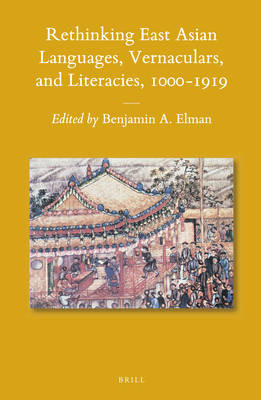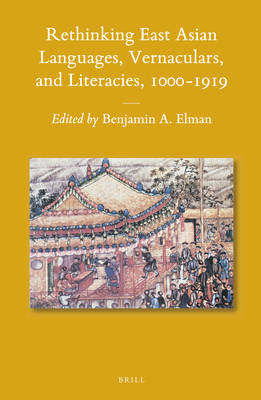
- Afhalen na 1 uur in een winkel met voorraad
- Gratis thuislevering in België vanaf € 30
- Ruim aanbod met 7 miljoen producten
- Afhalen na 1 uur in een winkel met voorraad
- Gratis thuislevering in België vanaf € 30
- Ruim aanbod met 7 miljoen producten
Zoeken
Rethinking East Asian Languages, Vernaculars, and Literacies, 1000-1919
€ 244,45
+ 488 punten
Omschrijving
The authors consider new views of the classical versus vernacular dichotomy that are especially central to the new historiography of China and East Asian languages. Based on recent debates initiated by Sheldon Pollock's findings for South Asia, we examine alternative frameworks for understanding East Asian languages between 1000 and 1919. Using new sources, making new connections, and re-examining old assumptions, we have asked whether and why East and SE Asian languages (e.g., Chinese, Manchu, Mongolian, Jurchen, Korean, Japanese, and Vietnamese) should be analysed in light of a Eurocentric dichotomy of Latin versus vernaculars. This discussion has encouraged us to explore whether European modernity is an appropriate standard at all for East Asia. Individually and collectively, we have sought to establish linkages between societies without making a priori assumptions about the countries' internal structures or the genealogy of their connections.
Contributors include: Benjamin Elman; Peter Kornicki; John Phan; Wei Shang; Haruo Shirane; Mårten Söderblom Saarela; Daniel Trambaiolo; Atsuko Ueda; Sixiang Wang.
Contributors include: Benjamin Elman; Peter Kornicki; John Phan; Wei Shang; Haruo Shirane; Mårten Söderblom Saarela; Daniel Trambaiolo; Atsuko Ueda; Sixiang Wang.
Specificaties
Betrokkenen
- Uitgeverij:
Inhoud
- Aantal bladzijden:
- 334
- Taal:
- Engels
- Reeks:
- Reeksnummer:
- nr. 115
Eigenschappen
- Productcode (EAN):
- 9789004277595
- Verschijningsdatum:
- 21/08/2014
- Uitvoering:
- Hardcover
- Formaat:
- Genaaid
- Afmetingen:
- 163 mm x 239 mm
- Gewicht:
- 635 g

Alleen bij Standaard Boekhandel
+ 488 punten op je klantenkaart van Standaard Boekhandel
Beoordelingen
We publiceren alleen reviews die voldoen aan de voorwaarden voor reviews. Bekijk onze voorwaarden voor reviews.







